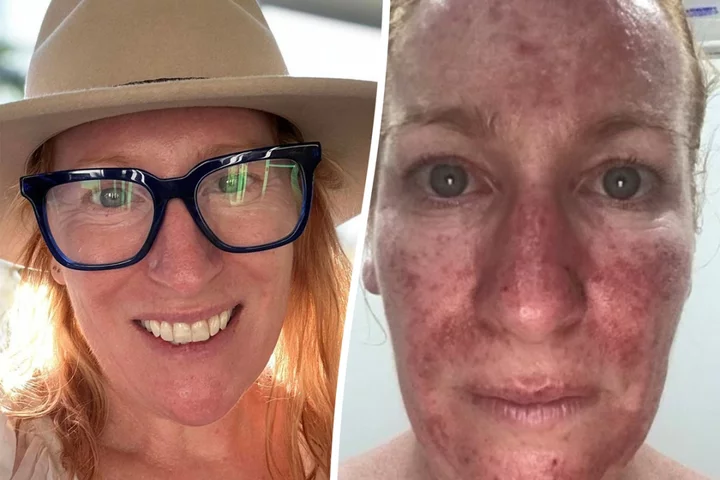
Bad Bunny: 2023 net worth and 5 unknown facts about rapper dating Kendall Jenner
Bad Bunny is among the highest-paid entertainers in the world
2023-05-09 15:52

Woman in ‘living hell’ with brain slipping down her spine after ice-skating accident
A 25-year-old who has been mostly bed bound by a painful condition that is causing her brain to slip down her spine is pleading for help to raise funds for lifesaving treatment in the US to stabilise her skeleton. Desperate to raise the £200,000 she needs, Emily Balfour, from London, said she will eventually face permanent disability and is at risk of paralysis if she does not receive PICL, a procedure that injects stem cells into the spine through the back of the mouth. An ice-skating accident at the age of 14 flagged the alarming conditions that cause Emily to now live with “relentless levels of pain”. She was diagnosed with Ehlers-Danlos syndromes (EDS), a collection of rare conditions affecting the connective tissues that make her joints unstable and prone to dislocation, as well as craniocervical instability (CCI), meaning the area where her skull and spine meet is dangerously unstable. Emily also has Chiari malformation, which means the lower part of her brain has herniated and is pushing down through the top of her spinal column. “My health is continuing to deteriorate but I still haven’t managed to raise enough money to get the treatment I need in America,” Emily said. “It would be lifesaving for me and, unless I get the treatment, my life is on pause and stagnated, I’ve become largely bed bound. “And this issue doesn’t just affect me, there are so many people with this condition who are struggling to get funds for treatment abroad. Money is the barrier for us being able to live our lives.” In 2011, Emily was first diagnosed with EDS after an ice-skating accident resulted in a trip to the doctors. I want to keep my sense of agency but it’s getting more and more difficult. Emily Balfour Once a sporty and active teen, Emily is now confined to her bed most days. Due to Chiari malformation, Emily’s brain is pushing down through the top of her spinal column and she said medical specialists have informed her that some of her brain is no longer in her skull. Emily once had dreams of working in film, but she is unable to complete her degree and is also not able to work while she struggles with her health. She said: “I’m not able to participate in life, I’m unable to work and I keep having to delay the completion of my degree. “I have limited vision, I can’t see out of my left eye and I have recently dealt with limb paralysis.” Earlier this year, Emily was rushed to hospital after her left arm became paralysed and swollen. She said: “It looked like a dead person’s arm, I feared I’d never regain mobility of it. “It turned out I was struggling with blood flow to the arm, and I’ve regained limited use of my arm, but I’m high risk of it happening again. “I’ve seen people with these conditions lose function of their arms completely and that obviously concerns me because I live by myself. “I want to keep my sense of agency but it’s getting more and more difficult.” Emily said her brainstem has been damaged to the point where her body is not functioning and she suffers daily from extreme fatigue, periods of paralysis, and loss of vision. It’s incredibly frustrating and I have to accept that I can’t live the life I thought I would. Emily Balfour As a result, Emily now finds herself largely bed bound, is regularly in and out of hospital and suffers from excruciating symptoms which threaten irreversible physical disability and potentially death. Innovative treatment in the US to stabilise her skeleton will be life-changing for Emily, but it comes at a cost. She hopes to raise £200,000 for multiple stem cell treatments, medical care and accommodation in Colorado, USA, where she will undergo a procedure known as PICL to repair and strengthen the ligaments that keep her skull stable. She said: “I’m in relentless levels of pain and, the more activity I do where I’m moving my neck, the worse the pain is. “If I don’t get treatment then it’s looking likely that eventually I will lose the use of one or both of my arms. “The longer it goes on, I’m losing more and more years of my life.” Before her diagnosis, Emily had dreams of working in film, having attended the BFI Film Academy as a teen. She also had plans to travel after finishing her English degree, which is currently on hold. Emily said: “It’s incredibly frustrating and I have to accept that I can’t live the life I thought I would. “I’m seeing other people my age having fun and building their careers but until I get the PICL procedure, I’m stuck. “There are other people who are also in my situation and it’s not an easy journey but I just hope that these treatments will be easier to access closer to home so we can get back to living.” I just want to be able to complete my degree and have a normal life and not be stuck in this living hell. Emily Balfour Emily hopes more research into EDS will result in more treatment options becoming available. For Emily, she says the procedure will be a lifeline and enable her to start living again. “Getting treatment will change everything,” she said. “I wanted to write and make films, but I am now more interested in medicine and want to get a psychotherapy qualification and work in that field. “I used to be so passionate about movies and reading, but because of my brain and vision issues, I’m restricted to audiobooks now. I can’t even do basic things like watching TV, that once brought me so much joy. “I just want to be able to complete my degree and have a normal life and not be stuck in this living hell.” To donate to Emily’s fundraiser, visit: www.gofundme.com/f/urgent-treatment-for-emily. Read More Four ‘red flag’ bowel cancer symptoms that can show two years before diagnosis Mother left ‘looking like Freddy Krueger’ reveals first skin cancer warning sign Woman ‘can barely move her hands’ after years of gel nails Charity boss speaks out over ‘traumatic’ encounter with royal aide Ukraine war’s heaviest fight rages in east - follow live
2023-05-09 15:26

Melissa McCarthy explains why The Little Mermaid benefits from 'more modern' message
'The Little Mermaid' star Melissa McCarthy thinks the new remake is so "special" because of its "modern" message.
2023-05-09 15:23

Take That are 'back for good' after Coronation Concert reunion
Take That fans can expect "much more" from the three-piece.
2023-05-09 15:16

Three Adani Firms Lose Endorsement of UN-Backed Climate Group
Three Adani Group companies, including Adani Green Energy Ltd., have lost their endorsement from the world’s leading arbiter
2023-05-09 14:17

Concern over Huntington’s patients ‘turned away’ from mental health support
Many people with Huntington’s disease are being turned away from traditional mental health support, a charity has claimed as it called for more to be done to help people with the condition. Some mental health services have told patients that they do not have the specialist care needed, leading to the Huntington’s Disease Association calling for better help and support for people living with the disease. Huntington’s disease is a condition that stops parts of the brain working properly over time and can lead to problems with movement, cognition (perception, awareness, thinking, judgment) and mental health. Most people with the inherited condition will start to show symptoms between the ages of 30 and 50 and it gradually gets worse for around 10 to 25 years until the person dies. During all this time, my mental health was worsening. I’d seen my uncle commit suicide a few years before after his diagnosis and him not receiving the correct support and I was at a similar point Daniel Johnston There is no cure for Huntington’s disease or any way to stop it getting worse. A small new poll of 105 people with the condition, shared with the PA news agency, found that 85% had attempted to access community mental health services. But among this group, 56% claimed they had been denied access to care, the Huntington’s Disease Association said. Daniel Johnston, from Horam, East Sussex, said his local mental health service “didn’t know” where to refer him. The 41-year-old father of two said: “When I tested positive for Huntington’s, there was no specific pathway from that point for any mental health support. “I was confused, upset and angry about the diagnosis. I didn’t, and still don’t, fully understand my feelings of confusion and anger. “I wasn’t referred to a professional psychologist or anyone who knows how to support someone with a life-changing diagnosis such as Huntington’s. “During all this time, my mental health was worsening. I’d seen my uncle commit suicide a few years before after his diagnosis and him not receiving the correct support and I was at a similar point. “It was only when I explained to my consultant in our six-monthly appointment earlier this year the extent of my thoughts that he contacted the crisis team for me, and they began a course of daily calls for two weeks. “From this point onwards it’s been getting better, but I feel so sad for others who slip through the net so easily. “It’s as if people get afraid when you mention Huntington’s and there’s confusion around treating Huntington’s and treating mental health. “I’m not surprised by the amount of people being denied access to mental health support services due to having Huntington’s – I have been one of those people and it’s really scary.” The charity said hurdles often occur for patients after they have been referred by their GP for mental health support. Local mental health teams have told patients that Huntington’s “doesn’t fall under the remit of what they’re able to provide treatment for”. The charity has launched a new campaign, Mindful of Huntington’s, to raise awareness of the cognitive impairment symptoms of the disease, and has called for greater access to mental health support. Cath Stanley, chief executive of the Huntington’s Disease Association, said: “Many people think of Huntington’s as a disease which impacts movement, but that is only half the story, and the non-physical symptoms are often overlooked. “At the Huntington’s Disease Association, we find people will most commonly be referred to mental health services due to cognitive symptoms such as irritability and aggression. “Throughout May, we will be focusing on these cognitive symptoms and the life-changing impact they can have. “The stark findings we’re announcing can’t be ignored – people are asking for much-needed mental health support, being turned away, and their health is deteriorating further. It is disappointing but not surprising to see that there’s still a lot of misunderstanding around Huntington’s.” To find out more visit: www.hda.org.uk Read More Charity boss speaks out over ‘traumatic’ encounter with royal aide Ukraine war’s heaviest fight rages in east - follow live Scottish first minister Yousaf calls cost of coronation ‘uncomfortable’ King Charles and other royals return to work after coronation Prince Harry’s ghostwriter opens up about harassment after ‘Spare’
2023-05-09 13:51

Biggest African Bank Cites Energy Needs in Fossil Fuel Defense
Standard Bank Group Ltd., Africa’s biggest lender by assets, defended it’s investment in fossil-fuel projects, saying tthe continent’s
2023-05-09 13:29

Mother left ‘looking like Freddy Krueger’ reveals first skin cancer warning sign
A woman who says skin cancer treatment has left her looking like Freddy Krueger is urging others to respect the sun. Melissa Lewis, 48, has been living with skin cancer for more than a decade. She has annual treatment which gives her skin a pockmarked look, which she has compared to that of Krueger, a fictional killer. Melissa, from Sydney, Australia, hopes the yearly procedure will keep her cancer at bay. But she wants to speak out to warn others of the harm sun exposure can do, before it’s too late. The mum-of-four, a former nurse, said: “When they said I have Bowen’s disease I thought that was it. “When I looked it up I was like, ‘Oh my god, I am never going to be free’. It is something I have to keep on top of. “I have treatment once a year. I hate it, it is really stressful as I know my skin will hurt. “I will have up to 14 days looking like Freddy Krueger, I can’t go out in public. “I look at my own kids when I have had the treatment and they find it hard to look at me. “I tell them that this is why you put sunscreen on, this is why you are careful.” Melissa first spotted a basal cell carcinoma - a sign of skin cancer - on her leg in 2011. She has since found them on her forehead, nose, chest and back and has lost count of how many have been removed. But in 2018, Melissa discovered what looked like a group of freckles lumped together in front of her ear. Thinking it was best to get it checked out, she paid a visit to her dermatologist. Melissa was then referred her to the Melanoma Institute in June 2018 - which confirmed she had a melanoma. “I was very lucky to have caught it when I did,” she said. “It did make me think that, ‘This is it’. The dread I experienced when I heard that word was really intense. “Having four kids thinking I am not going to be there with them was so overwhelming. “You automatically fast forward to the worst-case scenario.” A month after her diagnosis, Melissa had her melanoma removed. And, two months after her surgery, a biopsy revealed Melissa had Bowen’s disease - an early form of skin cancer. Melissa said: “I am never going to be free from this. “Basically if I don’t have my cancers removed, it can become a more serious invasive cancer.” Since she was diagnosed with Bowen’s syndrome, Melissa undergoes a yearly none-surgical cancer treatment - Photodynamic therapy. Photodynamic therapy is a treatment that involves light-sensitive medicine and a light source to destroy abnormal cells. Melissa said: “I hate it, I get really anxious before I know I am coming up for treatment. “It is really stressful as I know how much it hurts. “My future will be to repeat expensive Photodynamic therapy with CO2 laser every year and always six monthly full skin checks. “It will be the only way to prevent further surgery and keep non-melanoma skin cancers from becoming invasive cancer.” Read More Four bowel cancer symptoms that can show two years before diagnosis Mum put on life support after infected finger led to ‘devastating’ diagnosis 6 mouth cancer symptoms everyone should know Mother left ‘looking like Freddy Krueger’ reveals first skin cancer warning sign Mum put on life support after infected finger led to ‘devastating’ diagnosis 6 mouth cancer symptoms everyone should know
2023-05-09 11:54

TLC star Gwendlyn Brown reveals her parents Kody and Christine Brown buried fetus in their backyard after 'scary' miscarriage
As she was watching Season 1 Episode 2 of 'Sister Wives', Gwendlyn Brown casually mentioned that her parents Kody and Christine had buried a fetus in their backyard
2023-05-09 09:20

Eurovision Q&A: Käärijä is Finland's Cha Cha Charmer
The singer's unforgettable mash-up of industrial metal and hyperpop is among the bookie's favourites.
2023-05-09 08:54

Bob Huggins Uses Homophobic Slur During Radio Interview
Bob Huggins dropped a homophobic slur during an interview on Bill Cunningham's show.
2023-05-09 04:54

Grace Bumbry, 1st Black singer at Bayreuth, dies at 86
Grace Bumbry, a pioneering mezzo-soprano who became the first Black singer to perform at Germany's Bayreuth Festival during a career of more than three decades on the world’s top stages, has died
2023-05-09 04:46
